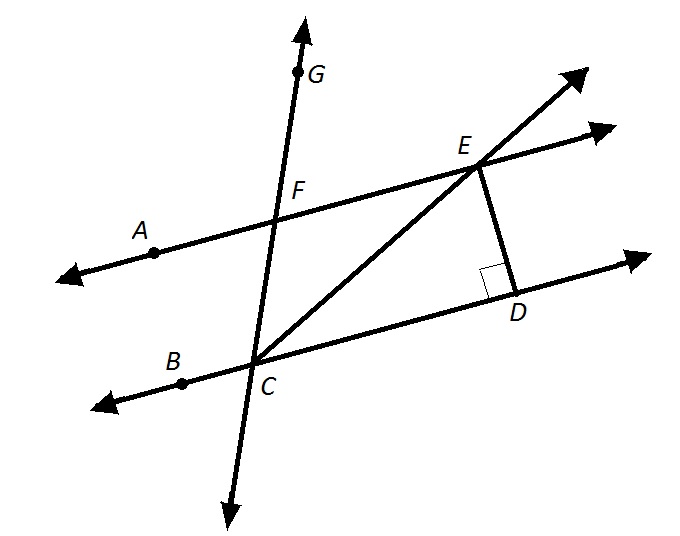Opposite and Corresponding Angles
Help Questions
GED Math › Opposite and Corresponding Angles

In the figure above, 



Explanation

Since we have two parallel lines, we know that 
We also know that 


We can then set up the following equation to solve for 
Thus, 

Now, notice that 

Suppose two vertical angles in a pair of intersecting lines. What is the value of 


Explanation
Vertical angles of intersecting lines must equal to each other.
Set up an equation such that both angle measures are equal.
Add three on both sides.
Divide by three on both sides.
The answer is:
With a pair of intersecting lines, a set of opposite angles are measured 


Explanation
Opposite angles of two intersecting lines must equal to each other. Set up an equation such that both angle are equal.
Add 9 on both sides.
Subtract 
This means that 

Suppose two opposite angles are measured 


Explanation
Opposite angles equal. Set up an equation such that both angle values are equal.
Add 5 on both sides.
Divide by 5 on both sides.
The answer is:

Find the value of 
Assume the two horizontal lines are parallel.
Explanation

Start by noticing that the two angles with the values of 

Thus, we can write the following equation and solve for 
Since 

Thus,
Suppose a pair of opposite angles are measured 


Explanation
Vertical angles are equal.
Set both angles equal and solve for x.
Subtract 
Add 8 on both sides.
Divide by 4 on both sides.
The answer is:
In two intersecting lines, the opposite angles are 


Explanation
In an intersecting line, vertical angles are equal to each other.
Set up an equation such that both angles are equal.
Solve for 

Add 14 on both sides.
Divide by 7 on both sides.
The answer is:

Refer to the above diagram.
Which of the following is a valid alternative name for 
Explanation
The name of a ray includes two letters, so 
The first letter must be the endpoint. Since 




Refer to the above diagram.



What is 
Explanation







We now look at 


Refer to the above diagram.
Which of the following facts does not, by itself, prove that 




Explanation
From the Parallel Postulate and its converse, as well as its various resulting theorems, two lines in a plane crossed by a transversal are parallel if any of the following happen:
Both lines are perpendicular to the same third line - this happens if 


Same-side interior angles are supplementary - this happens if 


Alternate interior angles are congruent - this happens if 

However, the fact that 


"



























































































